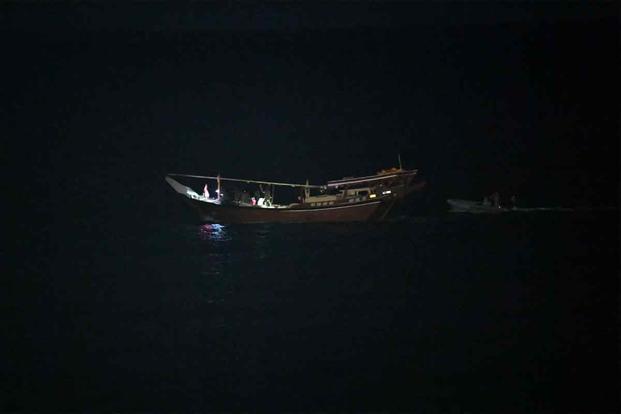Boarding parties from the Navy's guided-missile cruiser Normandy stopped a dhow in the Arabian Sea earlier this week and confiscated a cache of Iranian-made surface-to-air missiles and other advanced weaponry bound for the Houthi rebels in Yemen, U.S. Central Command said Thursday.
A video released by CENTCOM showed a small boat from the Ticonderoga-class Normandy approaching the dhow on Feb. 9 as crew members of the traditional Mideastern vessel gathered at the bow with arms raised in surrender.
In addition to three surface-to-air missiles, the arms cache included 150 "Dehlavieh" anti-tank guided missiles, Iranian thermal imaging weapon scopes, Iranian components for aerial drones and unmanned small boats, "as well as other munitions and advanced weapons parts," CENTCOM officials said in a statement.
The arms cache was similar to one seized in the Arabian Sea by the guided-missile destroyer Forrest Sherman in November, CENTCOM said.
The weapons seized by the Sherman "were determined to be of Iranian origin and assessed to be destined for the Houthis in Yemen" in violation of a United Nations Security Council Resolution barring weapons transfers to the Houthis, CENTCOM said.
The CENTCOM statement did not address the fate of the dhow's crew, but past practice for seizures of Iranian arms has been for the crews to be released after questioning.
The action by the Normandy in seizing the arms cache was the first publicly announced haul haul for the U.S. Navy since a Jan. 4 drone strike at Baghdad's International Airport that killed Iranian Quds Force leader Qasem Soleimani.
Related: CENTCOM: Iran Never Warned RQ-4 Drone Before Shootdown
Iran responded to Soleimani's killing with ballistic missile strikes on Al Asad airbase in Iraq's Anbar province on Jan. 8. The Pentagon said earlier this week that a total of 104 U.S. troops at Al Asad have since been diagnosed with mild traumatic brain injury from the concussive effects of the missile strikes.

The seizure by the Normandy suggested that Iran has not been deterred in what the U.S. calls its "malign activities" to spread influence in the region.
Iran has long backed the Houthis, who last week claimed more missile strikes against Saudi Arabia, in Yemen's civil war, which has resulted in what the UN calls the world's worst humanitarian disaster.
The Houthi uprising in 2015 seized control of much of the country and forced President Abdrabbuh Mansour Hadi to flee to Saudi Arabia.
Since then, a coalition of Arab states led by Saudi Arabia and the United Arab Emirates has been fighting to restore Hadi to power. Periodic international efforts at brokering a ceasefire and peace deal have been unsuccessful.
The U.S. has supported Saudi Arabia with refueling flights and training for Saudi pilots in avoiding civilian targets.
In Nov. 2018, then-Defense Secretary Jim Mattis said the effort to bring peace to Yemen was a reason to maintain close military ties with Saudi Arabia, despite the murder of Washington Post contributor and U.S. resident Jamal Khashoggi.
In an informal session with Pentagon reporters at the time, Mattis said he was working closely with United Nations Special Envoy Martin Griffiths to arrange for peace talks, but that effort also failed.
According to the UN office of the High Commissioner for Refugees (UNHCR), the conflict in Yemen has killed at least 100,000, displaced 4.3 million people and left an estimated 80% of a population of 24 million in dire need of basic necessities.
-- Richard Sisk can be reached at Richard.Sisk@Military.com.
Read More: National Guard Generals: America Needs a Space Guard













